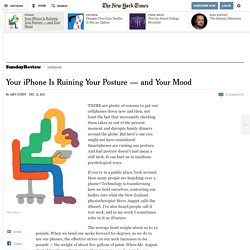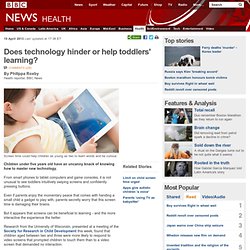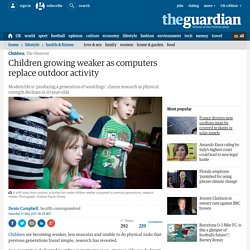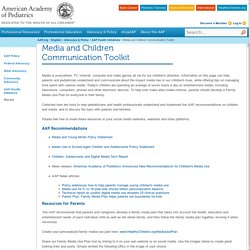

Esafety.gov. Top 5 Benefits of Technology in the Classroom. Resource Articles // Technology has transformed life as we know it, and the classroom looks much different than it did 50—or even 10—years ago. Traditional chalkboards have been replaced with digital whiteboards, and classrooms have a surplus of iPads. Is this advancement to the detriment of your students, or does it benefit their learning? According to the Pew Research Center, 92% of teachers said that the internet has a major impact on their ability to access content, resources, and materials.* Here are some of the ways educational technology improves the classroom experience: Creates a More Engaged Environment.
Your iPhone Is Ruining Your Posture — and Your Mood. Photo THERE are plenty of reasons to put our cellphones down now and then, not least the fact that incessantly checking them takes us out of the present moment and disrupts family dinners around the globe.

Are Smartphones Making Us Stupid? Screentime Is Making Kids Moody, Crazy and Lazy. Why Technology Makes it Hard to Raise Mentally Strong Kids. Why Steve Jobs Didn’t Let His Kids Use iPads (And Why You Shouldn’t Either) If you fall within the Gen-Y era like us, chances are you’ve given a bunch of thought as to how you would raise your own children in this day and age (assuming you don’t have children already).

Especially with technology, so much has changed since our childhoods in the 90s. Here’s one question: Would you introduce the technological wonder/heroin that is the iPod and iPad to your kids? Steve Jobs wouldn’t, and for good reason too. In a Sunday article, New York Times reporter Nick Bilton said he once assumingly asked Jobs, “So your kids must love the iPad?” Jobs responded: 3 Simple Rules for a Healthy Media Diet. Digital Nation - Life On The Virtual Frontier. How much screen time is OK for my kid(s)? I agree with PiperBoj completely.

With me, I get to play 1 hour on weekdays, and 2 hours on weekends, after chores, homework, and other related stuff. I've learned to deal with the time limit, even though I still disagree with it. But my biggest problem with my parents, especially my dad, is the automatic screen time limit put on my PC, and also time periods when I can play, which my dad never remembers to fix. Of course I don't agree with all these things. But if you want more time, stop complaining a lot, and yes, stop arguing with your parents about it, if you do. Using Technologies to Support Diverse Learning Needs.
Sesame best practices guide for children's app development. Touch screen technology is revolutionizing interactive digital experiences for children. No longer do our little ones need to wait to learn to navigate a mouse or press keyboard keys in order to access a host of interactive content designed for them. Instead, we see toddlers and preschoolers confidently navigating their parents’ iPhones, iPads, and other touch screen devices with astonishing agility and purpose.
Australia's most high tech playground is in western Sydney - Plough and Harrow playground. Does technology hinder or help toddlers' learning? 19 April 2013Last updated at 17:38 ET By Philippa Roxby Health reporter, BBC News Screen time could help children as young as two to learn words and be curious.

Outdoor, indoor, technology, nature – it’s all important child’s play. By Rachel Broadley Jane Webb-Williams (centre) observing children playing.

There’s a very good reason why children are encouraged to play – whether it be with toys, everyday household objects, nature or technology – it has implications for development that can reach well into adulthood, according to a UniSA researcher. Dr Jane Webb-Williams, whose research interests involve self-perceptions, play and identity within childhood, says research suggests play contributes to emotional, social, cognitive and physical development. Balance Technology With Outdoor Play Time for Healthier Kids - Parenting - NewsUSA Copyright-Free Articles. (NewsUSA) - Many children are too busy tweeting to go outside and hear a real tweet.

Children growing weaker as computers replace outdoor activity. Children are becoming weaker, less muscular and unable to do physical tasks that previous generations found simple, research has revealed.

As a generation dedicated to online pursuits grows up, 10-year-olds can do fewer sit-ups and are less able to hang from wall bars in a gym. Arm strength has declined in that age group, as has their ability to grip an object firmly. The findings, published in the child health journal Acta Paediatrica, have led to fresh concern about the impact on children's health caused by the shift away from outdoor activities.
Academics led by Dr Gavin Sandercock, a children's fitness expert at Essex University, studied how strong a group of 315 Essex 10-year-olds in 2008 were compared with 309 children the same age in 1998. Kids and Technology - Effects of Technology on Children. Getty Images Advertisement - Continue Reading Below If you're like many mothers of tweens or teens, you probably often find yourself gazing at the faces of your beloved children — as those faces are bathed in the flickering light of the television or the cool glow of the computer.

Kids Increasingly Staring at Glowing Screens, Study Finds. JEFFREY BROWN: And finally tonight, in a media-saturated society, how much time are our youngest children spending in front of their screens?

Pediatricians have long warned of the risks of exposing young children to too much television and other electronic devices. A new study suggests such warnings are having little effect. The study, released today by Common Sense Media, surveyed nearly 1,400 parents. Among it findings, nearly half of all kids under age 2 watch televisions or DVDs for up to two hours daily. Media and Children. Sample Social Media Messages Twitter Follow @AmerAcadPeds and @HealthyChildren for messages to share.

New tool from @AmerAcadPeds helps parents create a personalized Family Media Use Plan #DoGoodDigital. Kids And Screen Time: What Does The Research Say? : NPR Ed. Kids are spending more time than ever in front of screens, and it may be inhibiting their ability to recognize emotions, according to new research out of the University of California, Los Angeles. The study, published in the journal Computers in Human Behavior, found that sixth-graders who went five days without exposure to technology were significantly better at reading human emotions than kids who had regular access to phones, televisions and computers.
The UCLA researchers studied two groups of sixth-graders from a Southern California public school. One group was sent to the Pali Institute, an outdoor education camp in Running Springs, Calif., where the kids had no access to electronic devices. For the other group, it was life as usual. At the beginning and end of the five-day study period, both groups of kids were shown images of nearly 50 faces and asked to identify the feelings being modeled. AAPNEWS : AAP News. Copyright © 2015 by the American Academy of Pediatrics Authors. Screen Time Isn't Always Bad for Kids. Most parents know the importance of reading to their children.
Building a collection of baby books is one activity many parents enjoy doing when they first learn they are expecting. My 1-year-old son already has a large collection of books. From classics like Corduroy to bilingual books like La Oruga Muy Hambrienta / The Very Hungry Caterpillar. The significance of reading to kids, especially infants, was underscored recently when the American Academy of Pediatrics (AAP) released a new policy statement recommending pediatric providers promote reading to children from infancy until at least kindergarten. The policy advises that parents should be encouraged to read aloud to their young children as it can enhance parent-child relationships and help kids learn language and early literacy skills. 10 Reasons Why Handheld Devices Should Be Banned for Children Under the Age of 12 How Your Brain Works" Every animal you can think of -- mammals, birds, reptiles, fish, amphibians -- has a brain.
But the human brain is unique. Time-Lapse Movies of Brain Development: Supplementary Data. Root Parenting - Early child development research and insights. How the internet is changing language. 16 August 2010Last updated at 10:01 By Zoe Kleinman Technology reporter, BBC News. The benefits of new technology in language learning. Gary Motteram, editor of the British Council publication Innovations in learning technologies for English language teaching, explains how the arrival of digital technologies in the classroom has helped learning. Tan Le: A headset that reads your brainwaves. Teens say they’re addicted to technology. Here’s how parents can help. (iStock) Half of of all teens say they feel addicted to their mobile devices. That’s right, 50 percent of teens actually admitted that they feel addicted. Technology addiction disrupts teenage learning. (PhysOrg.com) -- Technology addiction amongst teenagers is having a disruptive effect on their learning, according to new research published today by Cranfield School of Management (UK).
Over a third (39.3%) of 11-18 year olds surveyed admitted that text shortcuts damaged the quality of their written English, particularly in terms of spelling. Class. Internet addiction changes brain similar to cocaine: Study. (CBS) Can a person be truly addicted to the Internet? A new brain scan study shows not only can that be the case, but also that Internet addiction might cause the same brain changes that are seen in alcoholics and drug addicts. For the study, published in the Jan. 11 issue of PLoS One, researchers studied 17 men and women who were diagnosed with Internet addiction disorder (IAD) and compared scans of their brains to scans of 16 healthy people who weren't addicted to the web.
Internet Addiction 'Disrupts Teenage Brains' As Much As Alcohol And Cocaine, Chinese Study Claims. Technology in Schools Faces Questions on Value. Educational Technology: Effectiveness of Computers in Education. Computers are increasingly being incorporated into school curriculums. Teachers present processes and concepts using programs such as Powerpoint, and students can utilize visual models and word processor to enhance their learning experience. Media influence on teenagers. How Technology is Changing the Way Children Think and Focus. Granny army helps India's school children via the cloud. Navy: Grow Sailors’ Brains With iPhone App. Controlling Computers with Your Mind. The hidden network that makes the internet possible - Sajan Saini.
The high-stakes race to make quantum computers work ... Are we living in a simulation? - Zohreh Davoudi. YouTube. How close are we to uploading our minds? - Michael S.A. Graziano. How one woman put man on the moon - Matt Porter & Margaret Hamilton. 10 ways to have a better conversation. Raffaello D'Andrea: The astounding athletic power of quadcopters. Thomas Suarez: A 12 year old app developer. Untitled.